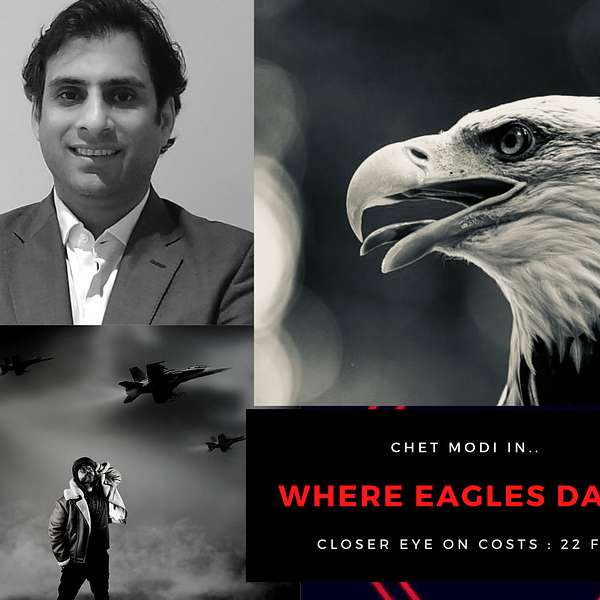
The New Fund Order
Deep from inside the City's shadows... author, speaker, NED and ex investment gatekeeper Jon 'JB' Beckett explores the Industry's taboo and hot topics. Dear Citizens of the People's Republic of Podcast, welcome! The New Fund Order is here; from existential risk to the human condition, a contrarian exploration of the Darkside, the Frontier and the Fringe of; Asset Management, Finance, Fintech, Mutual Funds and Macro. Bringing you news, views and interviews. Like a philosophy-economics mash up with science fiction, B-movies, Kung Fu films, cold war spy films, to Spaghetti Westerns... all delivered from the left-field with an Orwellian chill.. #newfundorder ALL VIEWS ARE INDEPENDENT. PLEASE check out my book website: https://www.blurb.co.uk/b/7337318-newfundorder-2-0 and Youtube channel https://www.youtube.com/channel/UClzN8gpccuVtdfW47TM_pPQ Season 2 ‘Fight Club’ is here ...
The New Fund Order
Where Eagles Dare: Closer Eye on Costs
Use Left/Right to seek, Home/End to jump to start or end. Hold shift to jump forward or backward.
Welcome to the New Fund Order. An Orwellian journey into the Darkside, the Frontier and the Fringe of Finance.
Are funds flying in formation when it comes to fund costs? On episode 003 we go all supersonic with ex Allfunds selector Chetan Modi, of 360FundInsight, on; fund transparency, jurisdiction wars and whether size really does matter.
We lock on target, on whether where you buy your fund manager is as important as who? Why not all shareholders in a fund are treated equally. How is technology changing the fund supply chain? Why do CEOs struggle to embrace it? Who are the Disrupters? Why is there a cost war between huge 'supertankers' and small boutiques? Do ETFs add value in the long run? What is stopping Google or Amazon coming in and taking over?
Fund selectors, advisers and investors have struggled to analyse fund costs accurately. Better tools and due diligence are needed. Chet explains why he co-created the Eagle Eye tool and the problem he sought to fix. Educating and supporting fund buyers on cost analysis.
Join me and Top Gun Chet as we dare to fly into the fund costs danger zone. Missiles locked.. framed by the chilling words of President Spiro Agnew on education, the visceral versus the intellectual..
Together with left-field opinion, global market news and latest views, direct from my dystopian bunker. In the Air, on the Ground, on the Street and around the corner of Debate. Watching, listening, in the Shadows and on your Airwaves. For Fund Selectors, distributors, wealth managers and investors.
In association with my sponsor Allianz Global Investors (AGI) one of the world's leading active managers. My thanks to my guest Chet Modi and 360FundInsight.. and you dear listener.
Please LIKE, SHARE and SUBSCRIBE. Please leave a REVIEW and let me know what you think and what topics you would like for future episodes. Until then... stay safe and.. keep it left-field!!
That's 20 episodes, 20 Guests, every 2 weeks... each episode is 25 minutes!
Join the NFO Army Citizen, https://www.patreon.com/newfundorder
Left-field Finance.
#newfundorder
Credits;
George Orwell 'Nineteen-Eighty Four', Public Domain 1.0.
Audio clips: Public domain 1.0, address by Spiro Agnew on Vietnam War Protests.
Speech extracts and sound effects by Archive.org and Soundbible.com. Creative Commons Attribution 3.0 and Public Domain 1.0.
All Music used by Silvermansound.com Attribution 4.0 International (CC BY 4.0)
Active is: Allianz Global Investors.
Disclaimer: This post contains affiliate links. If you make a purchase, I may receive a commission at no extra cost to you.
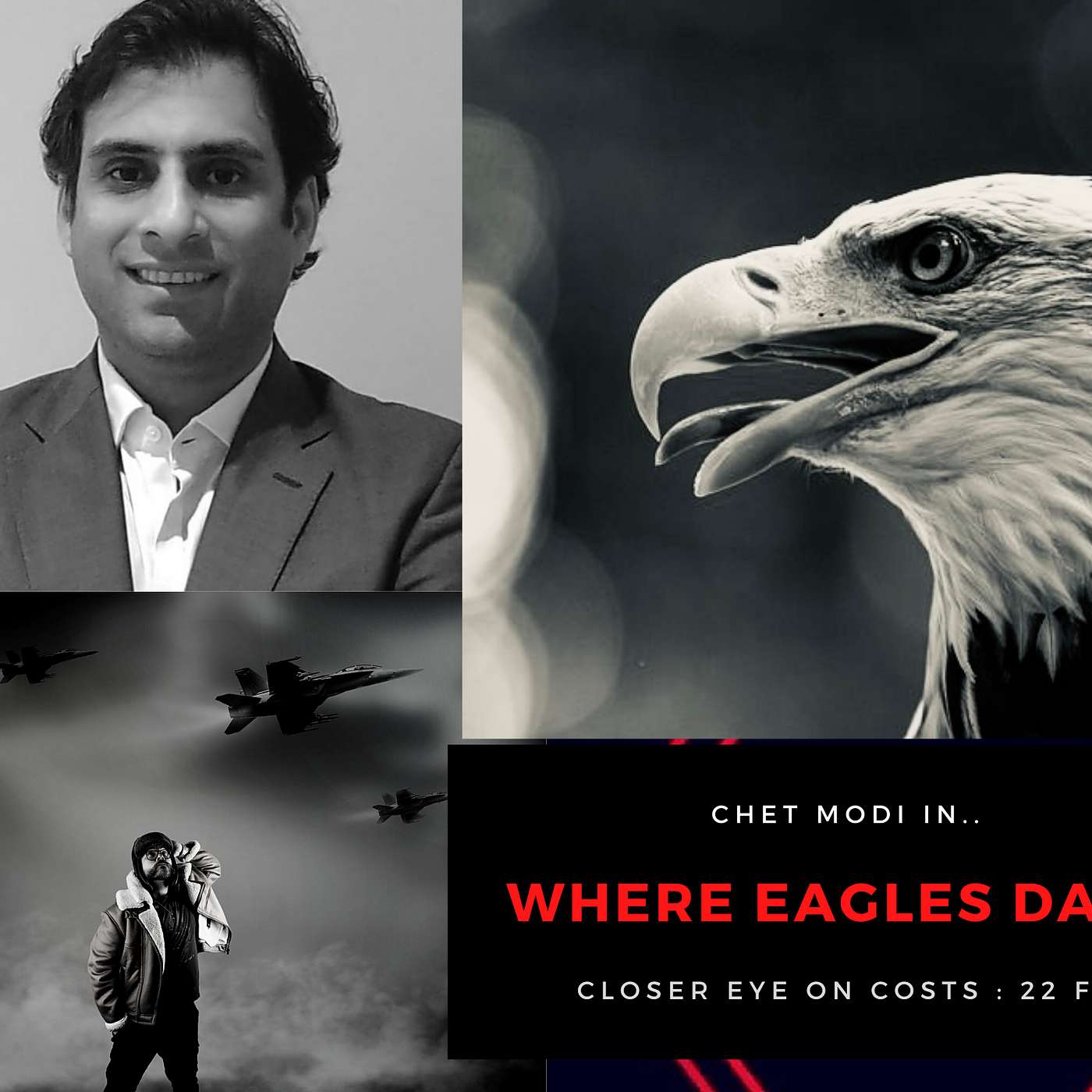

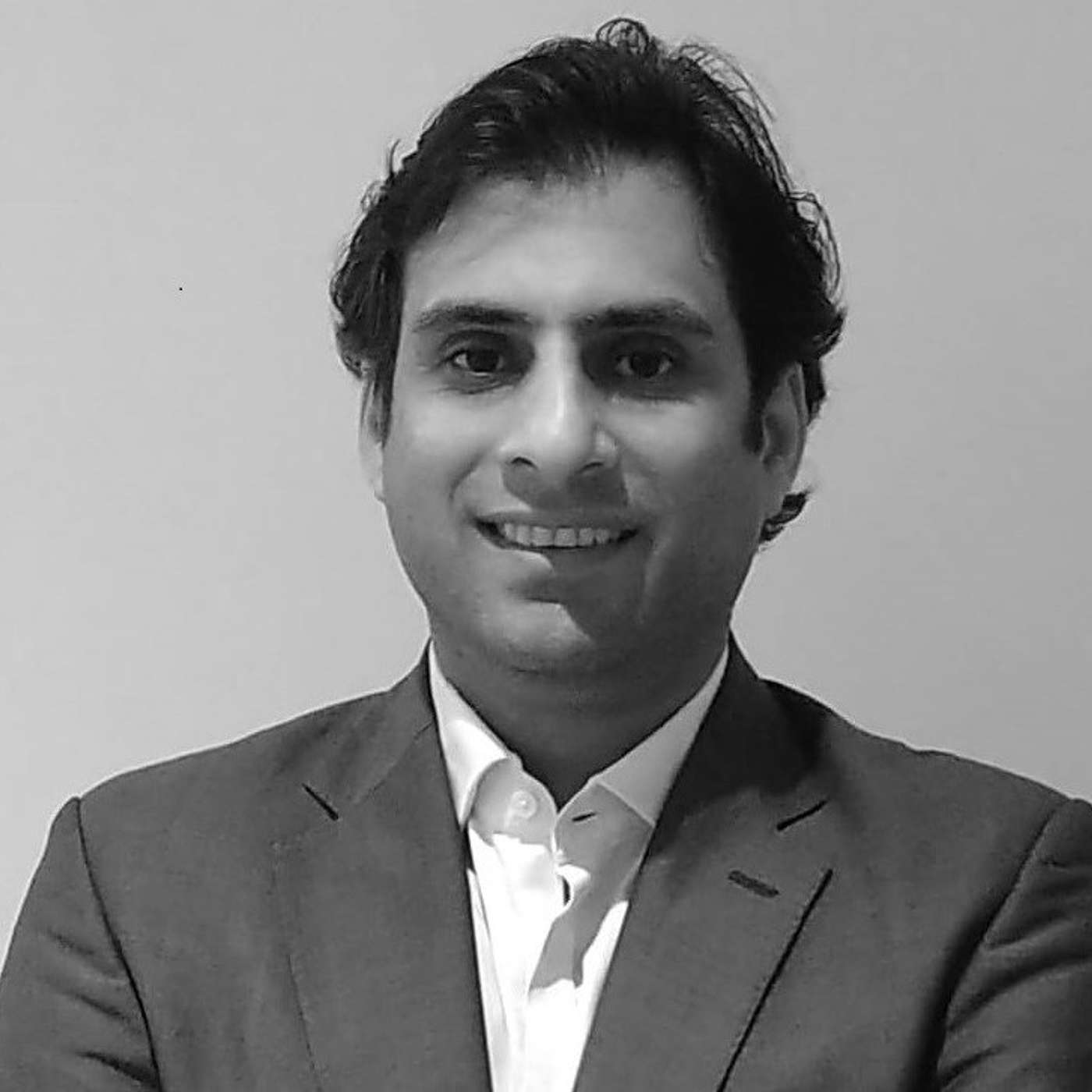

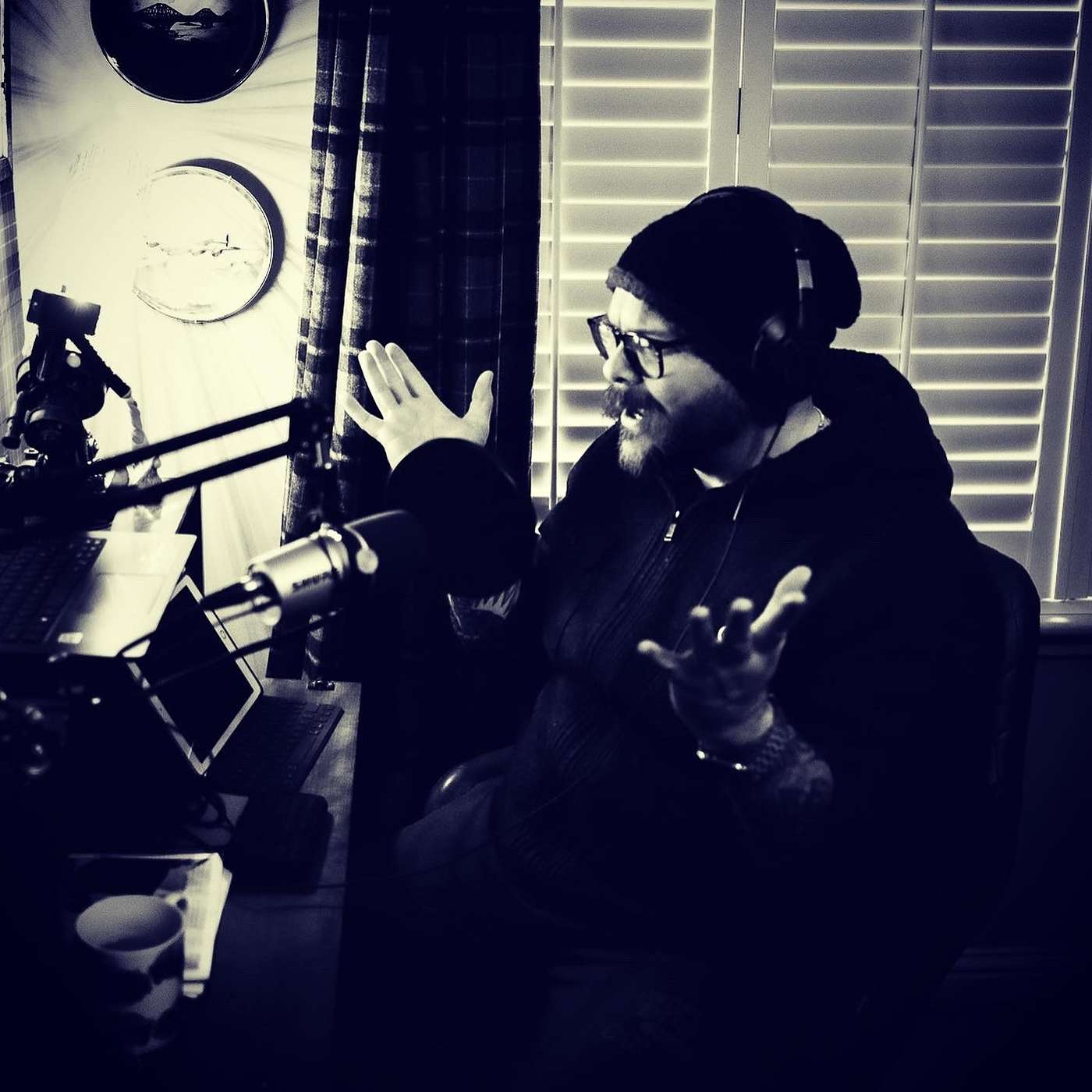

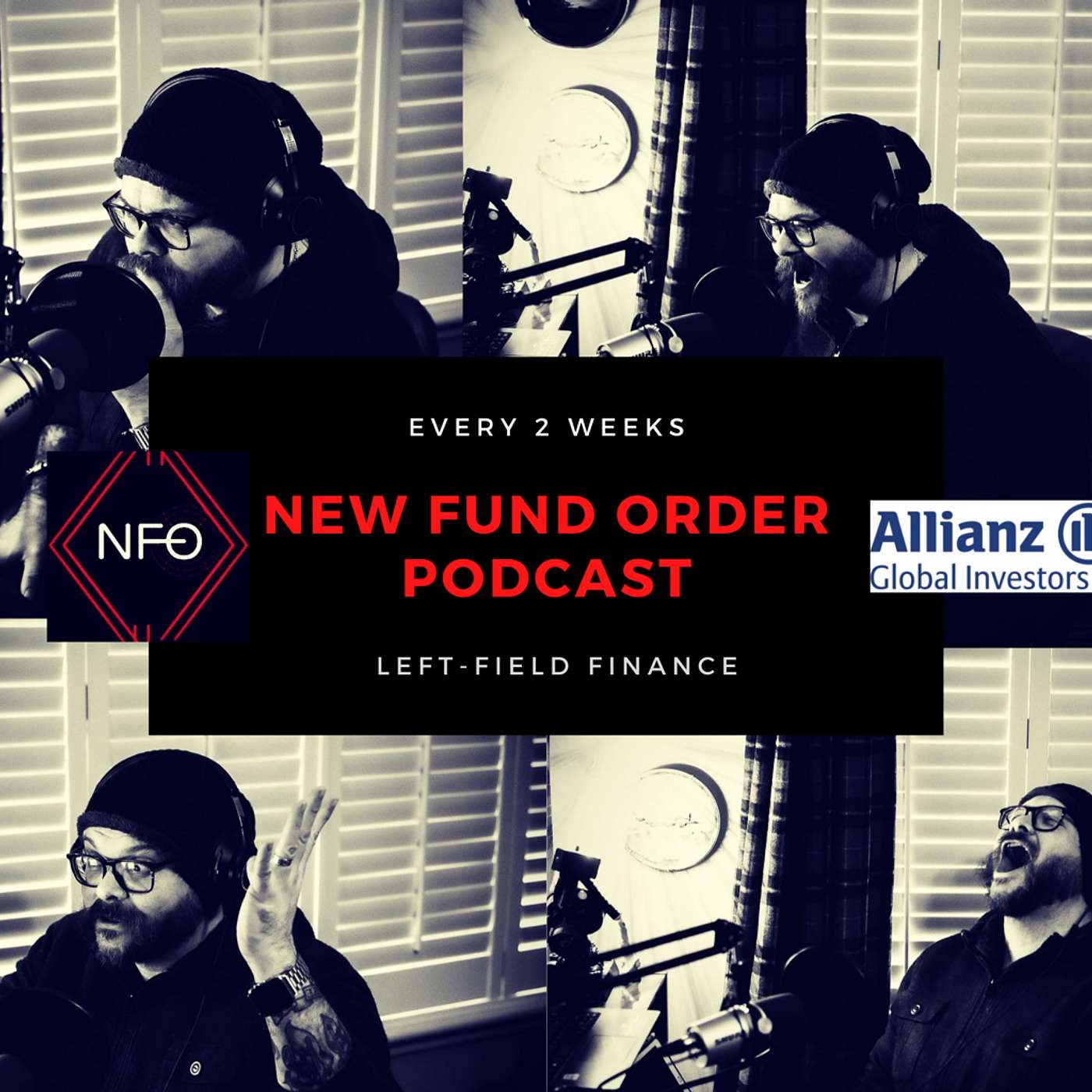
Spiro Agnew clip 0:02
[Introduction Clip] 'Sometimes it appears that we're reaching a period when our senses and our minds will no longer respond to moderate stimulation. Truth is to them revealed rather than logically approved..'
JB Beckett 0:23
Salutations Dear citizens as we peer into the new fund order to discover the immutable truth for asset management and wealth managers, the lowdown from the dark side the frontier and the fringe of asset management and fund research,
Spiro Agnew clip 0:40
'..and about which the most reckless conjecture cannot be discredited.'
JB Beckett 0:45
A podcast for wealth managers fund selectors distributors and investors bring it to you the People's Republic podcast on finance. In association with my sponsor Allianz global investors, capturing the latest market news views and interviews with leading minds in our industry.
Spiro Agnew clip 1:04
'..subtlety is lost and fine distinctions based on acute reasoning are carelessly ignored, and I headlong jump to a predetermined conclusion.'
JB Beckett 1:15
Allianz global investors is one of the world's leading 'active managers.
Spiro Agnew clip 1:18
[Clip] 'Education is being redefined at the demand of the uneducated to suit the ideas of the uneducated.'
JB Beckett 1:30
In today's episode citizens we're going to discuss cost transparency.
Our guest today is Chetan Modi of 365 [Fund] insight, a fund selector and analysts since 2006, and now founder of 360 fund insight and their cost analysis tool Eagle Eye just in case anyone's wondering why there's so many Eagle noises in this episode 360 his philosophy is very much built around the idea of guided architecture concentrating on outcome oriented solutions. Just previous roles include investment research analyst at Morningstar or BSR. And of course a senior analyst at all funds bank
Computer 2:08
Market news.
JB Beckett 2:11
Eu lawmakers overseeing new digital regulation you want to force big tech companies to pay for news echoing a similar move in Australia says the Financial Times MEP is working on the Digital Services Act and the digital markets act said the laws could be amended to include aspects of the Australian reforms.
Meanwhile, Amsterdam overtakes London as Europe's top share trading centre with average daily trading halving from 17 point 5 billion euros to 8.6 billion last month. And experts say this symbolic blog could be followed by the city losing jobs
KPMG chief bill Michael resigns after condemning 'moaning staff' on conference call, chairman of the Big Four accountant railed against employees 'playing the victim' during COVID
Continuing malaise for German payments company Wirecard after its admission that nearly $2 billion of the company's funds had gone missing
Imperial brands formerly known as Imperial Tobacco group, so a shareholder revolt over the pay of its new CEO Stefan Bomhard says the times just over 40% of shareholders voted against his 1.27 million pounds salary
Plenty of ongoing positive coverage of sharingalpha.com led by Oren and Yuval Kaplan, which has been recently quoted in Reuters as the world's largest fund rating platform, through its innovative wisdom of the crowd and track ratings performance model.
Lastly, plenty of coverage on Elon Musk promotion of Bitcoin on Twitter, then his company Tesla spending $1.5 billion on it in January, says Caitlin Astrov and Rebecca Elliot in the Wall Street Journal, and we'll be covering Bitcoin and cryptocurrency and what it means for finance and society later in the season.
And that's the end of market news tag, #newfundorder, and let me know what stories I should be covering.
And in these strange pandemic lockdown times, rest assured that all guests are calling in remotely.
And it's great to have you on the podcast Chet, and welcome to the new fund order.
Chet Modi 4:03
Thank you for having me. It's a pleasure.
JB Beckett 4:06
And of course, what I was really hoping to talk to you about today Chet was I guess is a massive topical subject for all fund selectors, which is fund transparency, cost due diligence and analysis, uncovering the true cost of fund management.
Chet Modi 4:23
Yeah, and, you know, that is one of the main reasons why we wanted to start our firm in the regulation, so the asset management, market study MiFID2, you know, wholesale changes in regulation, really, to provide better transparency and governance. And I think, we wanted to take the spirit of that regulation rather than, you know, asking the regulator to be too prescriptive and trying to achieve those goals of better transparency and governance and and part of part of that process is better cost and charges data, more accurate, more granularity. And you know, that, fundamentally is the bedrock of value for money analysis, which is is critical at the moment.
JB Beckett 5:11
Absolutely, Chet, and of course, like myself, you cut your cloth as a fund analyst as a fund selector. And, you know, I really was intrigued to know why move away from font selection to start your own firm, and what was the problem that you wanted to fix? As you saw it?
Chet Modi 5:30
I think as a fund selector, you know, you're sort of doing your job, you know, picking out funds that you think are best for your clients. But, you know, there's a whole load of work that goes on beyond that, and sort of trying to bridge that gap between, you know, sitting at my desk and saying, 'Well, you know, this is a great fund' between actually getting down to the kind of retail client, and how, how does that happen? And within the sort of framework of the new regulation, you know, there is a massive obligation on part of the the adviser or wealth manager to, to prove they've done some governance around costs and charges to show audit trails around that, because it, you know, picking the wrong share class really compromises best execution as well, which is also something you have to prove, under mifid2,
JB Beckett 6:23
Don't know about yourself Chet, but certainly, when I went through the first part of my career, I, you know, you faced a number of I guess biases and issues. And I think it's fair to say that fund selection has perhaps grown up. You know, what were the main biases and issues that you faced as a fund selector?
Chet Modi 6:38
if I buy one share class of a particular fund over another, is it still competitive, and I think, you know, this is one of the problems I faced in in, in a former life, which is, you sort of recommend the fund, you put it in a model portfolio, not all of the funds share classes are available across all of the platform. So if I'm an advisor, and I buy a fund for my client, and I'm buying what's available on my platform, but there is a cheaper share class available elsewhere, or another fund with another with a cheaper share class that might help improve the returns of my client, how do I know measuring the track record of a fund, you have to pick a share class, you don't know if that share class is available to advisors or not based on on the platform.
Another issue is I would say, the difficulties in recommending boutiques over over larger firms. So one of my experiences was, you know, having to recommend a boutique, I would say wanting to recommend a boutique. And the work I had to do over and above the sort of normal due diligence process, purely because of the fact that, you know, my peers, and maybe the industry had not heard of that particular boutique. So I think it's much easier if there is sort of ongoing governance and due diligence of a fund that's on your recommended list from one of the larger asset managers. And I want to add another fund from that asset manager, it becomes quite easy for me from a due diligence perspective. But if I want to recommend a boutique asset manager that many people probably haven't heard of that, that creates a lot of difficulties. And I think create technology that makes that decision making process a bit easier, where you're sort of taking an unbiased view towards whether an asset manager is large or small, and comparing them based on the strategy, the share class, and all of those sorts of things, you sort of level the playing field. And obviously, you've written a lot about supertanker funds, as well. So how do we help that, because there are a lot of boutiques, and they just get overlooked. For some of the reasons that I've mentioned, sometimes they're just not available on platforms and platforms, don't on-board them. Because, you know, there's not enough assets in those particular share classes, there's not enough assets and in the strategies that you're trying to invest in. So you sort of then you start touching on that kind of platform gatekeeper issue as well, which is sort of, you know, probably a reflection of infrastructure inefficiencies, if it means that it's so difficult to onboard a boutique asset manager,
JB Beckett 9:02
The tide has become even more difficult for for boutique asset managers. Because if I was playing devil's advocate with you, you know, for the first half of my career fund selectors didn't necessarily think about cost in the same way that they do today. And because of many of the business models that straddle through our our industry, it doesn't favour boutiques either, right? Because size does matter, in terms of getting third party supplier costs down etc. So if anything, now it's it's almost doubly more difficult, because fund buyers are in a post commission environment. And they're suddenly much more concerned about costs, particularly since MiFID2, you know, then inherent business models of fund management haven't changed along with that. So it does feel like it's almost mission impossible for boutiques at times.
Chet Modi 9:56
Yeah, I agree. And I think it's part of that reason is probably marketing and distribution budget, you know, the larger players, obviously would have more more budget to spend on getting their story out there. And, you know, I think boutiques or smaller asset managers have to be more mindful of that, because sponsoring a taxi or something like that, it's, it's just not, it's not plausible for them.
So, but, you know, I think you have to sort of separate the issue of cost versus the issue of value for money. And, you know, they don't necessarily go hand in hand, you know, costs and charges, if you've got the right data and inputs, you can do quite clear value for money analysis, value for money has to sort of be the bedrock of, of analysis going forward. And I think, you know, asset managers, large and small, probably have to think about how they get their story forward, in terms of value for money, making sure their costs and charges are, are appropriate to the strategies and and being transparent about it. Because I think if they're not transparent, and you know, the asset managers sort of risk scoring a known goal, in some ways, because people will just lean towards cheaper cost, which is, you know, essentially what we were saying, sort of trying to avoid, we do believe in active management, and I think there is a place for that. And so, essentially, that's a lot of the work that we've been doing over the past three years.
JB Beckett 11:24
Yeah, absolutely. And I think you mentioned supertanker funds earlier, and belying that the idea of slippage costs in the way that fund trades in and out of the market. That feels as if portfolio turnover costs and trading costs and slippage still remain quite taboo.
Chet Modi 11:43
Yeah, I mean, I think that's, that's always going to be difficult. I mean, it is interesting how the industry sort of finds it difficult to agree on many points that might improve transparency. I mean, that's just a sort of personal opinion. But I think they vary quite significantly, based on on how you report them. And I would say, you know, I think you probably know more than me, actually. But the larger firms probably have a bit of an advantage in that they could force down some of those costs. A bit cheaper. And I think for us, one of the interesting bits is the way that sort of additional costs, such as marketing and distribution are allocated to specific share classes. So I think, you know, transparency or certainly around transaction costs, having a kind of methodology that that everyone can trust, but also a bit more transparency about how those additional costs are allocated to different share classes, I think, is also quite an interesting point to sort of investigate further.
JB Beckett 12:45
Well, transparency is a bit like a byline just like ESG. Right, suddenly, everybody is on board. And suddenly everybody's transparent.. fund selectors, you know, we can forgive them for being a little bit cynical about that. What are some of the other big revelations that you've uncovered, from your analysis with the Eagle Eye tool?
Chet Modi 13:06
Asset managers or the industry as a whole? I would say could probably do a better job. I don't know if you read the [Financial] Times on on Monday. 'Funds flouting new transparency rules'. And so you know, the value for money assessments haven't gone, too well, I would say in terms of how how they are, how they've been published, being able to find them. I think, also, interestingly, is how custody costs are charged. So in some of our analysis, we've seen a big variation in custody costs that are that are passed down to investors. And, you know, that variation, we sort of looked at and thought, Okay, well, why is one asset manager paying significantly more? Well, we're talking, you know, single digit basis point, but but it all sort of adds up? Why are they paying more for custody versus any other asset manager? Now, there may be some kind of technical reasons behind it, but to my mind into our to our sort of thinking is, well, actually, could the asset managers, you know, force down those those custody costs a bit more? Could they be more competitive on those? Is it something they're actually thinking about? Because that cost is essentially just passed down to the investor so you know, do they need to be competitive about it because it's not necessarily affecting their margin. It does affect probably the headline OGC (Ongoing Charge). But, you know, again, the OGC is something you pay after the after the investment, not before.
JB Beckett 14:39
It certainly does feel like boutiques have no pricing power at all. In terms of custody back, I just wonder if we're always waiting for some sort of kind of technology revolution in custody. What we're seeing going on right now in the settlement side and the news from the likes of Banque de France, Calastone which are now starting to use blockchain technology, and that seems quite an exciting, you know, do we feel that that is going to just expand now through the fund industry?
Chet Modi 15:09
Well, I certainly hope so I think I think all of these kind of technological developments are, are needed. And I think it's about how willing people are to embrace these these technological improvements. So I wouldn't say for example, you know, fund companies, I wouldn't say that they are not transparent, I would say, actually, the data is all there, it's just quite difficult to find.. Calastone has done an amazing job at sort of being disruptive in that space, sort of trade execution space, they went to sort of flat fees for trades. I think that that's a massive help. But I think fundamentally, you know, technology, you have to sort of embrace that, the disruption element of that. And if you're, if you're a CEO of an asset manager, let's say it's potentially listed as well. And you've got the decision to to embrace some technology that could hit your bottom line, in the short run or, you know, affect your top line revenue.
But in the long run, it's doing the right thing for the industry and all participants and all investors. I think that's a difficult call for for asset managers, the leadership of asset managers, essentially, you know, the question is, you know, what is the appetite to do the right thing, essentially, the technology will force you to do it, and are you going to do it, before it forces you? Or are you going to be proactive in and I think, you know, companies like Calastone, have done great things around that, I think there's more companies that will, will be doing the same. And we'll start to see asset managers that are actually adding value, you know, through their investment management fees to level the playing field, because right now, you know, everything just seems to be around cost. And the cheaper, the better.
Well, because if we don't do it, I think they're sort of big threats. Because what's stopping, you know, Google, or an Amazon coming in and saying, Well, you know, the asset manager has done a terrible job, we can help you. And consumers know those brands better than they do the asset management brand. So if we don't start doing the right things, yeah, we could get into problems further down the line,
JB Beckett 17:27
You were talking about technology there. And of course, one form of technology has been around now around for over 20 years. And of course, that's the exchange traded fund. And I just wondered if you felt that ETFs present fund selectors with it, efficiencies versus traditional mutual funds? What was your analysis telling you?
Chet Modi 17:48
So I think, in certain cases, they they can probably provide efficiencies, I think, you know, if I'm looking for kind of broad exposure, quick exposure in some kind of tactical trading around funds, I think they absolutely make sense, as long as the sort of bid offers don't don't sort of make it more expensive, for example. But you know, I think I sort of saw something recently that the the FCA or I think it might be the Treasury is looking at the actual fund structure itself and seeing if it could be more efficient. I think we could do something around that. But I think ETFs probably do provide efficiencies in some cases. But if I'm a long term investor, and I'm going to hold a fund for, you know, 10 years, plus, I think there's probably efficiency, the gap between them probably narrows over the long term,
JB Beckett 18:38
You've also had the benefit of looking across markets across Europe. And you know, which ones do you believe offer fund selectors the best value currently? And of course, I'd have to then ask, which ones you felt probably the worst based on your analysis?
Chet Modi 18:57
Yeah. So I mean, maybe I'm a little bit biassed here. But But I think the UK, you know, that they've, they've got the toughest regulation. I would say in my experience advisors here [UK], use probably two, maybe three platforms. And I think the experience in Europe is probably the only use one. Platforms in Europe where I might only be using one like, well, I'm sort of relying on that platform to do the sort of best execution of the share class level. For me, I'm not necessarily looking at the open market, Europe probably has in two years POST MiFID now. You know, it has an opportunity, Europe now has an opportunity to just sort of take a bit of a clean sheet of paper and say, Well, actually, let's just do what is right, create new infrastructure and create a really competitive landscape as a result of that, you know, the, the end investors should should benefit.
JB Beckett 19:51
Are there any countries that you feel are still behind the curve?
Chet Modi 19:56
I don't want to name names JB.. And I mean, look I think continental Europe, I certainly think sort of Spain, Italy, and Switzerland probably have, have work to do. But I think the pace of change is quicker. So they could, you know, they could very quickly get to a place if they if they just embrace the regulation and take what the spirit of the regulation is, is trying to achieve massive improvements and efficiencies that can be gained if advisor firms just embrace all of the technology that's out there.
JB Beckett 20:30
Everyone seems to want to guess advertise their governance credentials? What's your what's your thought on the future direction, I guess, of the, you know, the Dublin versus the Lux versus the UK fund industry? You know, is that race going to continue? Do you think they will continue to compete with each other? Do you think the UK can remain competitive?
Chet Modi 20:55
That's a that's a really good question. And a very difficult one JB so thanks for putting me on the spot. You know, I think the UK has an interesting sort of position here, because, you know, they could do something quite interesting. In terms of improving governance, will it mean that will spread to to other countries? I don't know. Because fundamentally, there's tax implications, you have to kind of consider as well, and if they override the, the improvements in governance and efficiency that you might gain domiciled in Dublin versus the UK. You know, fundamentally, it's a commercial decision that will drive that. And I think that's going to be quite interesting. And so all of those kind of domiciles, they make it easier for asset managers to be there. Make it cheap for them to be there. Because fundamentally, there is a cost of being there. And if you're not gathering the assets, and if you're a smaller asset management company, you're not likely to spend a load of marketing and distribution in a jurisdiction that is probably not core to you.
JB Beckett 22:04
Yeah, I don't want to I don't want to endanger your neutrality. I think when it comes to fund jurisdictions Chet I know that we have a broad audience listening to this and of course the trade bodies that represent each of those jurisdictions are fighting hard right to you know, to maintain their their asset base and indeed try to grow it and they are aggressively trying to compete with each other. So I appreciate appreciate the candour
Computer 22:26
Rapid fire round.
JB Beckett 22:28
Now, before you go Chet.. I've been asking every guest to answer a quick rapid fire round of 10 questions plus one bonus question. And these are of course, just gut feel one answer. Are you ready?
Chet Modi 22:43
Yeah. As much as I'll ever be, I guess.
JB Beckett 22:47
Okay, let's get started. Question number one, bull or bear?
Chet Modi 22:53
Bull
JB Beckett 22:54
Bogle or Buffett?
Chet Modi 22:56
Buffett,
JB Beckett 22:57
Divest or engage?
Chet Modi 23:00
Oh, that's a tough one.... divest
JB Beckett 23:05
Lower cost or better value?
Chet Modi 23:09
Better value
JB Beckett 23:11
Supertankers or boutiques?
Chet Modi 23:13
Boutiques,
JB Beckett 23:15
Star managers or team players, team players,
Public or private?
Chet Modi 23:22
Public
JB Beckett 23:23
High growth or stable income?
Chet Modi 23:27
stable income.
JB Beckett 23:29
And the last one, which everyone loves to hate, is socialism or free markets?
Chet Modi 23:37
Somewhere in between? Is that allowed? Politics is not that binary is it? I would say I would say free market,
JB Beckett 23:52
great stuff.
Computer 23:53
Bonus Round
JB Beckett 23:54
Government bonds or Bitcoin?
Chet Modi 24:04
I might have to say Bitcoin actually.
JB Beckett 24:08
That marks the end of the interview Chet. You have survived the new fund order.. just want to say thanks very much for coming on.
Chet Modi 24:15
Thanks for having me. I really appreciate it.
JB Beckett 24:18
Thanks very much, Chet.
Please don't forget to like and share and subscribe you know, click the subscribe button, a new podcast every two weeks with a new guest. Stay tuned.
So what do we think Citizens? This idea of cost transparency has a number of unexpected and unforeseen consequences. It's also in some ways as actually hampered, free competition in asset management. More importantly, what we can see is there's a rising war between the aggregators, the super tanker sized asset managers, versus the smaller boutiques asset allocators are using passive and ETF based products more and more today, they have the purposes and I think that funds selectors need to be more engaged. Lastly, is this idea of competition between fund jurisdictions, right, we're seeing this increasingly acidic tone and narrative being played out by the different fund trade associations, the different jurisdiction,s the different domiciles, which destinations offer best value, both in terms of headline cost, but also cost transparency, and therein which actually offer the best governance and the best oversight controls to protect your clients money. The stark reality Citizens is that some fund jurisdictions are just simply charging you too much as fund investors, and that the transparency in some countries just isn't where it needs to be. There is a degree of regulatory variance and regulatory arbitrage that's occurring at the local level.
Spiro Agnew clip 26:03
[Clip] 'Life is visceral, rather than intellectual, and the most visceral practitioners of life are those who characterise themselves as intellectuals.'
JB Beckett 26:17
A Big thanks to you, dear listener for tuning in, brought to you by my sponsor, Allianz Global Investors. A warm thanks to today's guest. Legally, I am compelled to remind everyone that all views of this podcast are independent, and do not belong to any affiliation or organisation. Just in case that was in any doubt. Tune in for the next podcast every two weeks from the new fund order. Please subscribe, share, like and comment. Let me know what you think and what you'd like covered in future episodes. Till then stay safe and keep it left field.
Spiro Agnew clip 26:57
[Clip] 'The lessons of the past are ignored and obliterated, and a contemporary antagonism known as the generation gap. A spirit of national masochism prevails encouraged by an effete core of impudent snobs who characterise themselves as intellectuals.'
Transcribed by https://otter.ai